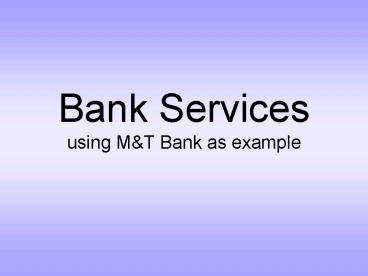Bank Services using M - PowerPoint PPT Presentation
1 / 16
Title:
Bank Services using M
Description:
Of households that have credit card debt, median is $2,200 balance. ... years of use of cards that accumulate points (for merchandise or airline tickets) ... – PowerPoint PPT presentation
Number of Views:95
Avg rating:3.0/5.0
Title: Bank Services using M
1
Bank Servicesusing MT Bank as example
2
Savings Accounts
3
Types of Savings Accounts
- MT Starter Savings - for people under 18
- no monthly fee
- free web banking
- free ATM access
- Relationship Savings
- no monthly fee if have checking acct
- free web banking
- free ATM access
4
Types of Savings Accounts
- MT Market Advantage - 3.5
- for maintaining significant savings
- no monthly fee if over 2,500
- tiered interest rates, depending on
balance - Certificates of Deposit
- 3 months to 10 years, fixed interest
rate - minimum balance of 1,000
5
What is a Certificate of Deposit?
- CDs are similar to savings accounts in that they
are insured and thus virtually risk-free they
are "money in the bank". - They are different from savings accounts in that
the CD has a specific, fixed term (often 3
months, 6 months, or 1 to 5 years), and, usually,
a fixed interest rate. - It is intended that the CD be held until
maturity, at which time the money may be
withdrawn together with the accrued interest.
6
Checking Accounts
7
Types of Checking Accounts
- Basic
- no minimum balance
- free atm access
- College Checking
- no minimum balance
e-Statements - free atm access free
Web banking - no service fee free
Web bill pay - MT check card
8
Debit Card vs Credit Card
- Debit Card
- - Easier to obtain
- Uses money you have
- On-line - immediate electronic transfer of funds
OR Offline - takes 2-3 days - Usage grew 3 times faster than credit card
2005-2007
Credit Card - Harder to obtain - Uses money you
dont have - Uses a merchant account -
ie Visa, MasterCard - Usage is slowing
9
Debit Cards Credit Cards
10
Credit Card Factssource Federal Reserve and
VISA USA
- Of households that have credit card debt, median
is 2,200 balance. - 40 of credit card holders pay their balance in
full every month. 60 dont. - 1 out of 10 has more than 10 credit cards.
Average is 4 cards. - Typical consumer has access to 19,000 on all
credit cards combined. - 23 increase in 5 years of use of cards that
accumulate points (for merchandise or airline
tickets) - U.S. VISA transactions conduct more than
1,000,000,000,000 (1 trillion) in annual volume.
11
Debit Card Factsaarp.org - Managing Money
- Generally dont have to show ID or sign at
purchase - Faster in checkout than checks or credit cards
- No interest
- Lower processing fees to storeowner than credit
card - Less protection than credit card if something
goes wrong with your purchase - Less protection than credit card if card is
stolen or mis-used
12
How Do I Know My Money is Safe?
13
FDIC Insurance(Federal Deposit Insurance
Corporation)
- Formed June 16, 1933
- United States government corporation created by
the Glass-Steagall Act of 1933. - Created because of the number of bank failures
during the Great Depression. - Glass-Steagall Act separated banks into
commercial and investment banks. Insured
commercial bank deposits. - Provides deposit insurance which guarantees the
safety of checking and savings deposits in member
banks, currently up to 100,000 per depositor per
bank - FDIC currently has 4,125 employees
14
FDIC Insurance
- FDIC Insurance covers
- Checking Accounts
- Savings Accounts
- Certificates of Deposit
- FDIC Insurance does not cover
- Stocks
- Bonds
15
So, what happens if my bank fails?My Money Your
Money.com
- FDIC steps in and takes a role as receiver.
- FDIC will try to sell failed bank to other bank
and awarded the failed bank to another bank, bank
re-opens with a new name and do a business as
usual. - If FDIC couldnt find any buyer, it will sell the
institutions assets to pay depositors and
creditors. This may take few weeks to months
until you see your insured money back. - Since the start of the FDIC in 1933, no depositor
has ever lost a penny of insured deposits.
16
FDIC Lessons
- Never exceed FDIC insurance limits, as you may
NEVER be able to get your uninsured money back. - New Bail-Out bill raised FDIC insurance limits
to 250,000.































